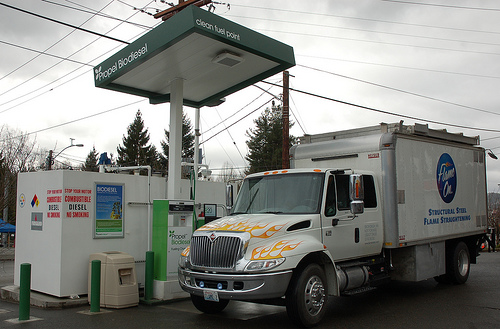
Vehicles that use biodiesel fuel decrease the United States' dependence on imported conventional oil since biofuel is made from natural resources and blends that contain vegetable oil and even soy. In addition, these vehicles are environmentally friendly as biofuel releases less carbon dioxide than standard automobiles.
Several car manufacturers produce vehicles that can be integrated with these biofuel alternatives, including Audi, BMW, and Dodge. Typically, little to no engine modifications are needed to operate a vehicle that has been approved for use with biofuels, which means that vehicles come pre-equipped with biofuel capabilities. This simplifies the ordering process for new automobile owners who want to use this clean fuel technology.
As of 2009, more than 15 types of vehicles that use biodiesel fuel have been recently released by their manufacturers. The biodiesel and biofuel trucks that are available include the 2009 Dodge Ram 2500 and the 2009 Ford Super Duty. Some trucks that will be available in 2010 and beyond include the Ford F-150 Light Truck and the GM Chevrolet Silverado.
Compact cars, vans, and sport utility vehicles have also been produced with biofuel capabilities. The Touareg, Jetta TDI, and Jetta Sportswagen TDI are all 2009 Volkswagen models that can be run on biofuel. The Mercedes-Benz R320, Dodge Sprinter Van, and BMW 335d are other vehicles with biofuel capabilities.
The care and maintenance of vehicles that use biofuel is much the same as conventional fuel vehicles. However, two issues will need to be monitored: the growth of algae in the fuel tank and the buildup of sludge. Both of these problems can block the fuel filter, affecting performance of the biofuel. To prevent these problems, change the fuel filter regularly, use algicides to control the growth of algae, and keep your fuel tank topped off so that there's no chance for algae or sludge growth.
Throughout 2008, biofuel availability for U.S. consumers experienced growth, expanding to more than 2,800 retailers and distributors with biofuel supplies, according to the National Biodiesel Board. In addition, about 700 biofuels were produced in 2008 in the United States. By the year 2015, the National Biodiesel Board has stated that its goal is to replace the equivalent of 5 percent of the United States' on-road vehicles with vehicles that use biofuel.
Biofuels emit about 15 percent less carbon dioxide than standard vehicles. In addition, one particular biofuel, biodiesel B20, can reduce hydrocarbon emmissions by 20 percent and carbon monoxide by 12 percent. Biofuels are also nontoxic and biodegradable, which makes them a renewable resource that is more efficient than standard petroleum fuel.
According to the National Biodiesel Board, biofuel vehicles can increase fuel efficiency up to 40 percent in some cases. For example, the 2009 BMW 335d received a 36 highway miles per gallon rating using biofuel capabilities while the standard gasoline version received only 26.